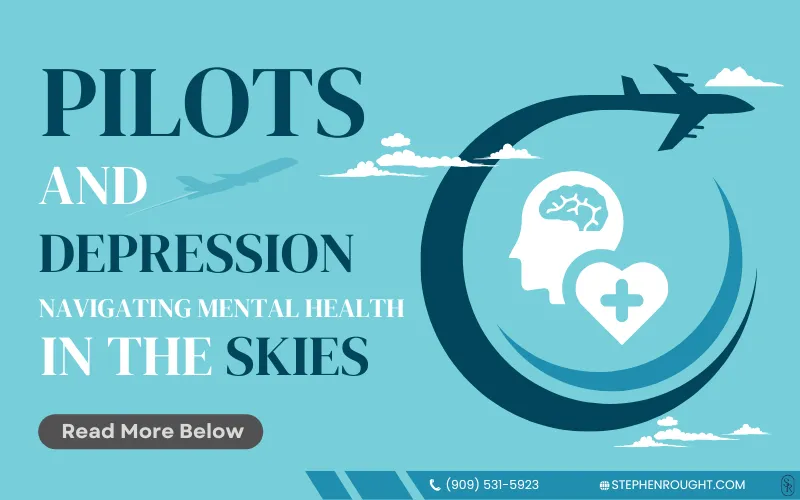
Pilots and Depression: Navigating Mental Health in the Skies
Pilots and Depression: Navigating Mental Health in the Skies
Pilots are often seen as the epitome of professionalism and precision, responsible for the safety of hundreds of passengers at a time. Yet, behind the cockpit doors, these skilled aviators face personal battles that aren’t always visible to the public eye. One of the most significant and often under-discussed challenges faced by pilots is mental health, specifically depression. In an industry where the stakes are high, and the pressure to maintain impeccable performance is immense, depression can be a silent and dangerous adversary.
The Unique Pressures Pilots Face
Pilots operate in a high-stakes environment where even a small mistake can have serious consequences. The responsibility of ensuring a smooth flight, managing complex technical systems, and navigating through ever-changing weather conditions requires not only technical expertise but also strong emotional resilience. However, despite their training, pilots are not immune to the pressures of daily life that can lead to mental health struggles.
Long hours, irregular schedules, and time zone changes contribute to physical and mental fatigue, often leading to stress. The intense nature of their work can also create feelings of isolation, especially when away from family and friends for long periods. Add to this the societal stigma surrounding mental health, and it’s easy to see how depression could go unnoticed or untreated among pilots.
Depression in Pilots: A Growing Concern
Depression is a serious mental health condition that affects millions worldwide, and pilots are no exception. While the public might imagine pilots as calm, confident, and always in control, they too can experience the heavy toll that depression takes. Pilots may face the overwhelming weight of emotional distress, from feelings of sadness and hopelessness to a lack of interest in activities they once enjoyed.
The consequences of untreated depression can be devastating, not just for the pilots themselves but also for the passengers they serve. A pilot’s ability to make clear, decisive judgments is compromised when mental health is neglected, putting both their safety and the safety of others at risk.
Signs of Depression in Pilots
While depression manifests differently in each person, there are several common signs that may suggest a pilot is struggling with the condition. These include:
Fatigue or loss of energy: Depression can leave a pilot feeling physically and mentally drained, even after a full night’s sleep.
Difficulty concentrating: Pilots are required to maintain focus and make split-second decisions. Depression can make concentration difficult, leading to mistakes or oversight.
Loss of interest: A pilot might lose interest in hobbies, socializing, or the very work they once loved.
Changes in appetite or sleep patterns: Significant weight gain or loss, as well as trouble sleeping, are common indicators of depression.
Irritability: While irritability can sometimes be a reaction to stress, depression can amplify these feelings and make them harder to control.
The Aviation Industry’s Approach to Mental Health
The aviation industry has long maintained strict health and fitness standards for pilots, but mental health has historically been a grey area. Traditionally, there has been a significant stigma associated with seeking help for mental health issues, especially in a high-pressure job like piloting.
Breaking the Stigma
A key challenge in addressing depression among pilots is the stigma that surrounds mental health in aviation. Many pilots are reluctant to seek help for fear that it will impact their job performance, or worse, result in them losing their license. Pilots may fear being grounded indefinitely if they are diagnosed with a mental health disorder, and this fear can prevent them from reaching out for assistance.
To combat this, it’s essential for the aviation industry to continue fostering a culture of openness and support around mental health. The well-being of pilots is just as important as their physical health, and there needs to be a more accepting approach to mental health issues in the cockpit.
What Can Be Done?
Education and Awareness: Educating pilots about mental health and providing resources for recognizing the early signs of depression is key. Knowing that seeking help is not a sign of weakness, but rather a necessary step in maintaining their safety and the safety of others.
Confidential Support: Offering confidential counseling and mental health services is crucial. Pilots need to know they can seek help without the fear of their job or reputation being put at risk. Confidentiality is essential to building trust and encouraging more pilots to reach out when they need support.
Peer Support Programs: Sometimes, pilots may feel more comfortable talking to fellow aviators who understand the unique challenges of their profession. Peer support programs can provide a safe and non-judgmental environment for pilots to discuss their struggles and share coping strategies.
Regular Mental Health Assessments: Just as pilots undergo regular physical health assessments, mental health evaluations should be incorporated into the medical certification process. Regular check-ins with mental health professionals can help identify any early signs of depression and prevent it from escalating.
Conclusion
The mental health of pilots, especially in regard to depression, is a topic that requires more attention, compassion, and understanding. While the aviation industry has made strides in addressing mental health, there is still a long way to go in breaking down the barriers of stigma and ensuring that pilots have the support they need. After all, a pilot’s mental well-being is just as crucial to a successful flight as their ability to navigate the skies. By fostering a supportive and open environment, we can ensure that pilots are not only physically fit but mentally well-equipped to carry out their vital work with the care and precision that we rely on.
Looking for help, but you are afraid of receiving a diagnosis? Reach out today and you can have an brief consultation call to discuss what treatment options are available without the fear of receiving a diagnosis.
Stephen Rought, LCSW Can Help You

I can help you understand the importance of mental health maintenance and getting back on track. Whether through individual therapy or couples counseling, I am here to help your emotional well-being.
📞 Contact us today to start your journey toward renewed energy and emotional wellness.
📧 Email: [email protected]
🌐 Website: stephenrought.com

Stephen Rought, LCSW
Proudly Accepting
Aetna and Medicare Insurance


Disclaimer
Stephen Rought, LCSW does not guarantee any specific outcome. All content provided on the Stephen Rought, LCSW website is provided for educational or informational purposes only. Consult medical professionals you are working with about whether any opinions or recommendations provided through this website apply to you and your unique circumstances
Currently, all online therapy sessions are conducted using the HIPPA compliant Telehealth service doxy.me
SErvices
Individual Therapy
Parent Coaching
Financial Therapy
Couples Counseling
Family Therapy
